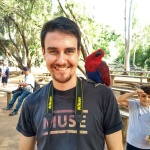

Luke Morris
l.morris@aims.gov.auOLD
Recipient of an AIMS@JCU Scholarship
PhD
College of Science and Engineering

Luke Morris
l.morris@aims.gov.auOLD
PhD
College of Science and Engineering
The role of nutrients in coral bleaching
Luke grew up near Brighton (UK) and always took a keen interest in nature and biology but was swayed towards aquatic environments through the home aquarium industry. This led to him studying for an MSci in Marine Biology at the University of Southampton, where he developed a passion for coral biology and studied the impacts of nutrient availability on coral physiology. Now, at AIMS and JCU, Luke seeks to unravel the central role that nutrients play in coral bleaching.
The role of nutrients in coral bleaching
2017 to 2021
Project Description
Luke's project seeks to understand how nutrient availability affects the health and associated Symbiodiniaceae communities of Great Barrier Reef corals, before, during and after thermal bleaching. The project will use a combination of field samples and laboratory experiments to tackle outstanding questions in coral nutrient and thermal stress physiology.
Project Importance
Mechanistic links between nutrient availability and coral bleaching susceptibility have been drawn from laboratory studies. However, the impact of nutrients on coral thermal tolerance in the field remains unclear. Improving our knowledge of this relationship is vital to better understand the mechanisms of coral bleaching, and how nutrient pollution impacts coral thermal tolerance.
Project Methods
Luke's project will integrate measures of coral physiology, carbon metabolism and ITS2 amplicon sequencing of Symbiodiniaceae to understand how nutrient availability impacts coral thermal tolerance. These approaches will be applied to 1) field coral samples taken over a natural coral bleaching event and 2) field-collected corals exposed to nutrient and thermal stress in the laboratory.
Project Results
I hope to find out how nutrient and thermal stress affect coral physiology, carbon metabolism and Symbiodiniaceae communities in Great Barrier Reef corals. More specifically: how nutrients impact bleaching in the field, the bleaching of corals from different environments, and the recovery of corals following bleaching.
Keywords
Algae,
Biochemistry,
Biostatistics,
Climate change,
Coastal development,
Controlled Environment,
Coral reefs,
Corals,
Distribution,
Ecology,
Field based,
Genetics,
Interaction,
Management tools,
Manipulative experiments,
Microbiology,
Molecular techniques,
Monitoring,
Natural disturbance,
Ocean warming,
Physiology,
Pollution,
Quantitative marine science
Supervised By:
Mark Baird (CSIRO)
Publications:
(2021) Cantin, N.E., Baird, M.E., Morris, L.A., Ceccarelli, D.M., Mocellin, V.J.L., Ferrari, R., Mongin, M. and Bay, L.K.
Assessing the linkages between water quality and coral bleaching on the Great Barrier Reef’, Report to the National Environmental Science Program (NESP), Reef and Rainforest Research Centre Limited, Cairns, 158 pp. https://nesptropical.edu.au/wp-content/uploads/2021/05/NESP-TWQ-Project-3.3.1-Final-Report.pdf
(2021) Baird, M.E., Mongin, M., Rizwi, F., Bay, L.K., Cantin, N.E., Morris, L.A., and Skerratt, J.
The effect of natural and anthropogenic nutrient and sediment loads on coral oxidative stress on runoff-exposed reefs’, Marine Pollution Bulletin, 168, 112409. https://doi.org/10.1016/j.marpolbul.2021.112409.
(2020) Fuller, Z.L., Mocellin, V.J.L., Morris, L.A., Cantin, N., Shepherd, J., Sarre, L., Peng, J., Liao, Y., Pickrell, J., Andolfatto, P., Matz, M., Bay, L.K. and Przeworski, M.
‘Population genetics of the coral Acropora millepora: Toward genomic prediction of bleaching’, Science, 369, 6501, eaba4674. https://science.sciencemag.org/content/369/6501/eaba4674
(2019) Morris, L.A., Voolstra, C.R., Quigley, K.M., Bourne, D.G. and Bay, L.K.
‘Nutrient availability and metabolism affect the stability of coral-Symbiodiniaceae symbioses’, Trends in Microbiology, 27, 8, 678-689. https://doi.org/10.1016/j.tim.2019.03.004
(2017) Morris*, L.A., Rosset, S.L., Reed, A.J., D’Angelo, C. and Wiedenmann, J.
Oral presentation. ‘The impact of heterotrophic feeding on the physiology of the coral host and associated symbiont in contrasting dissolved inorganic nutrient environments’, 90th Annual Australian Coral Reef Society Conference, Townsville, Queensland, Australia, 16th-19th July.
(2016) Rosset*, S.L., Reed, A.J., Morris, L.A., D’Angelo, C. and Wiedenmann, J.
‘The impact of dissolved inorganic nutrient availability and heterotrophic feeding on the physiology of the coral host and the associated symbiont’, 13th International Coral Reef Symposium, Honolulu, Hawaii, USA, 19th-24th June.
(2015) Morris, L.A.
‘Assessing the nutrient status of the coral Euphyllia paradivisa by spectrofluorometric measurement of lipid bodies and green fluorescent protein (GFP)-like pigments’, MSci thesis, University of Southampton, UK, 52 pp.